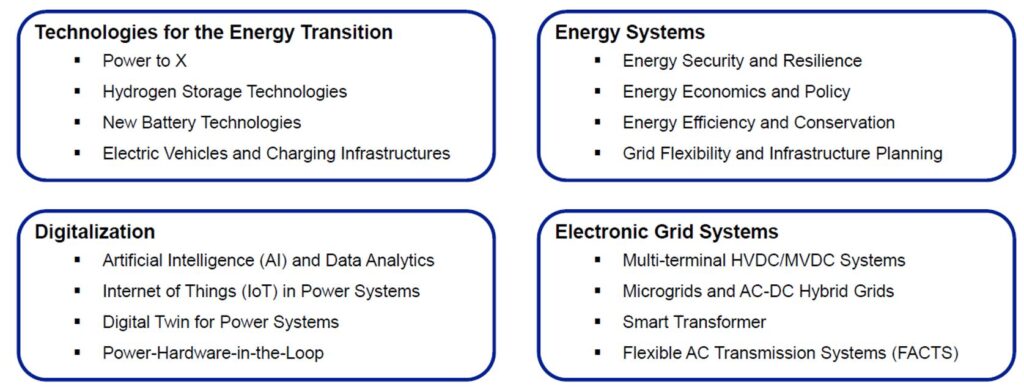Focus Areas

1) Electronic Grid Systems
The increased use of volatile renewable energies, sector coupling, and the electrification of important consumer sectors are posing major challenges for the control and operation of electrical networks. The integration of converter-based systems and the simultaneous decommissioning of conventional power plants require new approaches to maintain stability under these changed conditions. For example, decentralized feed-in to the distribution network requires new concepts on voltage control, frequency support and power flow reversal in AC-networks. Together with converter-based loads the building of medium-voltage DC-networks is an alternative which has to be investigated. The expansion of decentralized generation plants also requires long-distance power transmission, which leads to a higher utilization of the existing transmission systems and the integration of HVDC systems, which might be extended to multi-terminal HDVC-systems. In addition, higher utilization of existing infrastructure can also mean a reduction of stability margin, which in turn raises the question of system-wide blackouts and network restoration. In this context, this focus topic will provide an insight into the current developments, projects, technologies, and research for the following sub-topics:
- Multi-terminal HVDC Systems
- MVDC Systems
- Microgrids and Hybrid AC-DC grids
- Smart Transformer
- Flexible AC Transmission Systems (FACTS)
2) Energy Systems
As energy systems must become climate neutral in a very short time, challenges along this journey are in the focus. The transition must also be supported by the relevant energy markets, with the power market exchanges as the most important players. The topics addressed in this focus area include energy security and resilience, power market design, energy economics and policy, energy efficiency and conservation, grid flexibility and infrastructure planning, system integration and carbon intensity of electricity generation and consumption.
3) Technologies for the Energy Transition
The energy transition is leading to major changes in the electrical energy system. The integration of renewable energy producers poses new challenges for electrical grids. Efficient sector coupling plays a key role in the successful energy transition of transport and heat supply and influences the transformation of commercial and industrial locations. The technologies address new and innovative aspects of energy generation, the integration and transformation of energy systems towards a decarbonized, resilient and multimodal system of the future and the use of suitable power-to-X-technologies for sustainable sector coupling. Particular attention will be paid to the system- and grid-friendly operation of the new equipment. The focus of the Special Topic is on distribution grids in urban and rural areas with a supply of households, mixed areas and commercial and industrial areas.
The PT25 offers excellent contributions on the topics listed below the opportunity to give an oral presentation. The target group of this Focus Area are research institutes and institutions that wish to submit a contribution on the following topics:
- – DER Technology
- – Stationary battery storage
- – Energy management of energy systems (LV grids)
- – Cellular and multimodal energy systems
- – Production of green hydrogen
- – Power-to-X technologies for sustainable sector coupling
4) Digitalization of future power systems
Digitalization strategies and techniques can significantly streamline the energy transition. This broad spectrum encompasses integrated, increasingly automated processes in planning, operation, and asset management within integrated energy systems. Central to these methodologies are data analytics, big data management and utilization, and data-driven modeling for power systems. Furthermore, machine learning and artificial intelligence play a pivotal role.
Innovative approaches like digital twins extend beyond traditional models, supporting multiple process stages and necessitating appropriate IT approaches. Digital modeling approaches, including power hardware in the loop testing, offer novel ways to transition solutions from theory to practice.
The complexity of these topics is underscored in presentations and panel sessions featuring experts from academia and industry, highlighting the confluence of theory, practical implementation, and future potential in the realm of energy systems.

